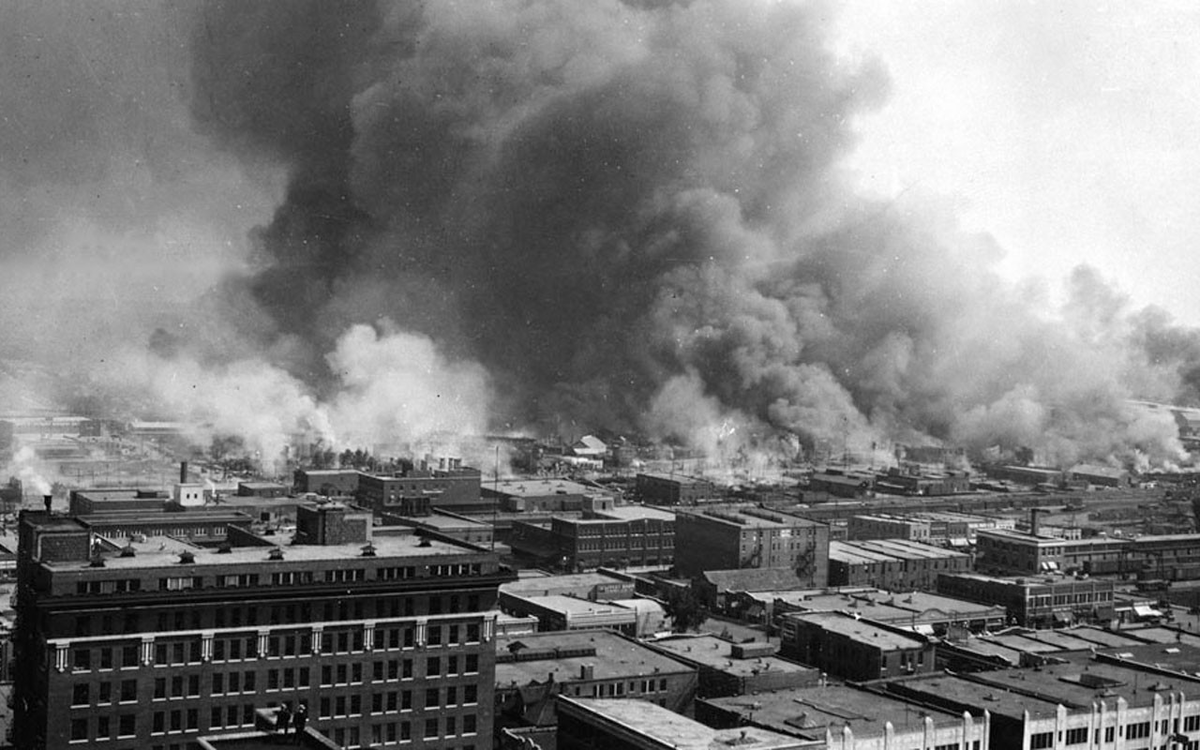As Sick as Our Secrets

Flames across the Greenwood section of Tulsa during the 1921 Tulsa Race Massacre. United States Library of Congress: https://www.loc.gov/pictures/item/95517018/
There is a true truism among family therapists and recovery groups: a family is as sick as its secrets. In this week during which the eyes of national reporters, and beyond, have turned to Tulsa, the insight about families is being employed to reflect on Tulsa’s history of keeping secrets, of nearly complete silence, for much of the century since the 1921 Tulsa Race Massacre.
Families, congregations, cities, and nations are also only as healthy as how they deal with their secrets. A grandparent left trouble in Europe and came to the U.S. to escape. Keep the secret or you might be in danger. A pastor commits suicide in the church office on a holy day. Keep it secret or the reputation of the congregation is ruined. A nation is founded on high ideals but also theft and violence. Talk only about the high ideals; about the rest, keep silent or change the story.
In 1970, a retired National Guard brigadier general decided to dig into a story about what was then called the Tulsa Race Riot—nomenclature used by journalists around the country referring to racial violence in the post-World War I era (1919 was known as Red Summer for the nearly 40 episodes of White on Black violence). He received death threats. He moved his family away from Tulsa to keep them safe.
When he tried to interview survivors, he encountered a great deal of fear of retribution, as well as unaddressed trauma. When he attempted to interview White people who lived in Tulsa in 1921, he was met with closed doors, silence, and sometimes anger. In reflecting on why he received those response a half century after the event, the writer noted timing: White men in their teens and twenties in 1921 were city leaders in 1970. Were they feeling shame? Guilt? Doubling down on hate, as one KKK member told him about regretting they did not “finish the job?”
Silence and secrets.
Recently, I organized a panel of White and Black, Jewish and Protestant religious leaders in Tulsa to talk about race and religion in Tulsa today. Among them were leaders of congregations active in 1921. Two of the predominantly White congregations have records of the sermons preached after the massacre, blaming Black people for the violence.
Several other congregations conducted board meetings soon after the event. In the minutes of those meetings, there is no record of the massacre in their own city, the death of maybe 300 people, destruction of many hundreds of buildings (including by representatives of the city), and the displacement of thousands was not mentioned, let alone addressed. Silence, the beginning of the secret. Black and White people in Oklahoma taking Oklahoma history were kept ignorant about the massacre for most of a century.
There is all that trauma in the city’s soul. Blood crying out from the soil.
Sometimes a secret is formed and kept by changing the story to eclipse the truth. We see an attempt at such in real time today regarding the January 6 insurrection. One of the nation’s two ruling parties is rejecting a deep investigation. Some propaganda networks are pushing the story that the invaders were from the political Left disguised as the Right. One lawmaker, who is photographed barricading the doors against the mob, claims the crowd looked just like any normal tourist group. Change the story to hide the truth.
Growing up in the North, I did not know about the Lost Cause. The Civil War was fundamentally about whether the practice of slavery would advance to new states or be contained. As the war progressed, so did the cause, pushing toward emancipation and the elimination of chattel slavery. But some Southerners, including Christian clergy, claimed the issues were Southern honor, Southern ways of life, and political matters such as states’ rights versus a tyrannical federal government.
The war’s outcome was a God-ordained cleansing for the South’s incomplete righteousness. Slavery—it was not so bad, the Lost Cause voices said. It was in keeping with God’s racial and patriarchal hierarchies. The South will rise again. Textbooks influenced by Lost Cause advocates in textbook-influential Texas focus on the lost graciousness of Southern living and the war of Northern aggression. Thus, the Big Lie of 19th century America still lives.
Change the story. Keep the secret.
For a nation birthed with high ideals but also founded on violence, land theft, and bondage, we have a lot of reckoning to do. While body cams, cell phone videos, exhuming hidden stories, and breaking silences “disrupt” the patina of peace, these disruptive acts are necessary and good. It is these acts which give us a chance to fix that which can be fixed.
For that which cannot be repaired, religious communities have some worthy tools to share: rituals and actions of confession, repentance, penance, restitution, forgiveness, and reconciliation. We also have the knowledge, when we remember, that when silences are broken and secrets uncovered, communities cannot get to forgiveness and reconciliation without taking the other steps first.
Break the silence. Exhume the secret. Reveal a truer story. Muster the collective courage to deal with the truth.
Dr. Gary Peluso-Verdend is president emeritus at Phillips Theological Seminary and is the executive director of the seminary’s Center for Religion in Public Life. The opinions expressed in this blog are those of the author. Learn more about the Center’s work here and about Gary here.


Comments are closed.